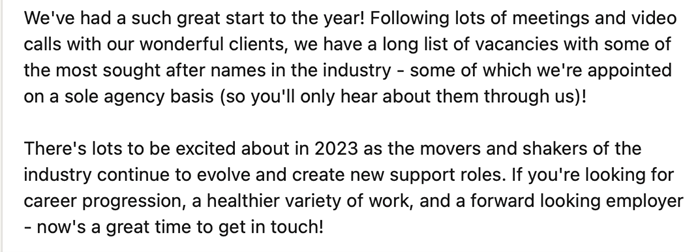I joined our profession a staggering 30 years ago. In other words, before the internet, before email, before smartphones, long before we could log into systems from anywhere in the world. Online filing would’ve meant nothing to anyone in those days and I bet if anyone had predicted it, they would’ve been subjected to raised eyebrows and possibly some amount of ridicule. It was a very different time indeed. We still faxed letters and all their enclosures in those days and we negotiated with clients which enclosures they needed by fax in advance and which ones would be sent via snail mail only. I can still hear the supremely annoying noise of the fax machine as it dialled and transmitted and I remember the agonising moments when you filed a new patent application with the European Patent Office that contained 84 pages but the confirmation the fax machine spit out only confirmed submission of 83 of those pages, and so you’d fax the whole thing again, watching as the fax machine slowly slooooowly processed page after excruciating page while having to make sure that it didn’t accidentally suck in two pages because that would’ve meant starting all over again. We also requested “file inspections” and I spent many a phenomenally tedious afternoon at the German or European Patent Office taking actual physical photocopies of entire file contents, on a good day removing what must’ve been hundreds of staples.
I also vividly remember though that I was immediately fascinated by the global nature of the world of IP and by that sneaky peak behind the curtain working in IP allows you. That hasn’t changed although I must admit I have very much questioned my choice of industry close to a million times along the way, trying different paths a couple of times and still returning to IP every single time.
Looking back, I am deeply grateful for how things panned out for me. This job and this industry have allowed me to carve out quite the exciting life, learning and progressing in many different directions while witnessing the continuous evolution our industry is by definition all about, which also includes the evolution in how we work. My experience working in various countries, in-house, in private practice (the latter for the majority of my career) and for other service providers, both employed and as a freelancer, has given me what I came to appreciate as a unique vantage point. This vantage point has allowed me to observe the unfolding of these changes in real time while also actively contributing to and participating in them.
For what it’s worth, my verdict’s in: in my humble opinion, the road ahead is very exciting indeed for IP professionals at every stage and level, especially but by no means limited to the various levels of administrative and support staff who are still predominantly female.
The old days are far behind us, fading in sepia tones and now barely visible in the rear mirror. The overall development of technology and corresponding fundamental change in the interaction between all stakeholders has over the years necessitated new structures, specifically in IP private practice. This development has taken time, not least because in our industry, faced with a hugely intricate legal framework complete with deadlines galore, requiring coordination around the globe, and the subsequent necessary focus on liability, every change to the system requires extra careful planning and consideration. In IP, and specifically in private practice, there just isn’t the same room for error that might exist in other industries. Still, over time, things changed and continue to do so at a more rapid pace than ever before.
To accommodate these new structures and overall changes, new skill sets and therefore new roles become necessary and are already being created.
The fact that we are seeing these changes is genuinely great news for all those who want to do something a bit different without necessarily wanting to leave IP.
We have already seen a change in some of the classic IP administration and support roles which consist largely of assistance/paralegal and docketing roles still predominantly held by women. There have in recent years increasingly been specific roles on offer for, eg, individual client portfolio management and IP operation managers responsible for an ever-widening range of diverse functions and tasks.
But we are now also seeing – and I find it almost impossible to contain my excitement about this – project, process and change managers. In some cases, it is not strictly required but certainly advantageous to have an IP background. Meaning, these might well be areas you could inhabit if you were so inclined.
The advent of these new roles also opens up opportunities in private practice to get involved in client service and business development within the context of the challenging but ultimately highly rewarding (and, frankly, healthy) fact that private practice has for some years provided individually and intricately tailored services to its clients.
The implementation of various forms of IP intelligence presents another option to get involved and develop specialist expertise.
Internal training is another area that I believe will become ever more important especially as most private practice firms have neglected this aspect for far too long. If firms want to attract bright and engaged staff they should be aware that the current generation entering the working world is no longer lured in by a fruit basket and private pension fund.
And then there might well be the option to contribute to content creation in the context of marketing and PR.
Or, indeed, to move into the wider world of IP service providers and consultancy.
All of these options already exist, waiting for ambitious and curious individuals to realise them, in firms that are inclined to make the best possible use of the expertise that is already available to a large degree within their own ranks and/or can and should be developed and brought on board.
What we are seeing, in a nutshell, is a move away from silo structures and rigorously defined roles and job specifications towards a more interrelated approach with increasing bandwidth. What a fantastic opportunity for anyone with an appetite for it.
If all of the above doesn’t seem tempting enough for you yet: the Unified Patent Court with its unique litigation opportunities, including for European patent attorneys now entitled to act as representatives before this new Court, will lead to the need for and creation of further specialist roles.
How do I know this, and does all of this not sound a bit too utopian, you might ask?
That’s a very appropriate question.
Over the years, I’ve had the chance and, frankly, seized and created every opportunity, to delve into virtually all of the above areas to various degrees. I was of course lucky enough to find myself in firms and environments that encouraged such growth and were more than happy to give it a go. In addition, I have been fortunate enough to meet others who, like me, have chosen to walk a different career path while staying within the IP professional environment and I have asked them to share their take on it.
Daniel John is an IP recruiter and the founder and director of IP Support which is part of The Law Support Group. He shared his take with me and subsequently also with his entire network just a few days ago on LinkedIn:

Magdalena Chodaczek has been working as a remote-only freelance certified patent paralegal based in Hamburg, Germany. Based on her observations over the last years, she has added yet another exciting perspective (one I wholeheartedly endorse) to the above which I feel very much deserves to be the subject of a separate article: in future, IP professionals will be able to take on even more responsibilities which will inevitably shift the centre of gravity amongst stakeholders in the profession, with IP professionals becoming more of a sparring partner for business development. Collaboration between the various roles will thus be more at eye level than has been the case to date.
In my view, this can only be good news for all stakeholders and will allow firms to benefit from the extensive expertise their employees or freelancers gain with every single project and out-of-the-box responsibility. As already mentioned, it is likely that this expertise already exists to some degree, however, more often than not it is not (yet) allowed to flourish nor is it taken seriously (yet) as a contribution to a firm’s strategy and success. It is high time for that to change.
As a final note, I would like to encourage you to not just wait for new opportunities but to proactively seek them, suggest them, create them. To not shy away from sharing your thoughts and ideas. It is my firm belief – a belief that is confirmed both by my own experiences and by many an inspiring conversation in recent years – that there are more and more firms embracing and pushing for these changes, with some firms very much paving the way in this regard. It is also my belief that the firms willing to do just that will be richly rewarded.
For me, personally, these opportunities have not just significantly broadened my horizon, giving me great personal satisfaction in the process, but have ultimately reignited my passion for what I do and reconfirmed that IP still is the place to be for me.

Sabine Rehaber

